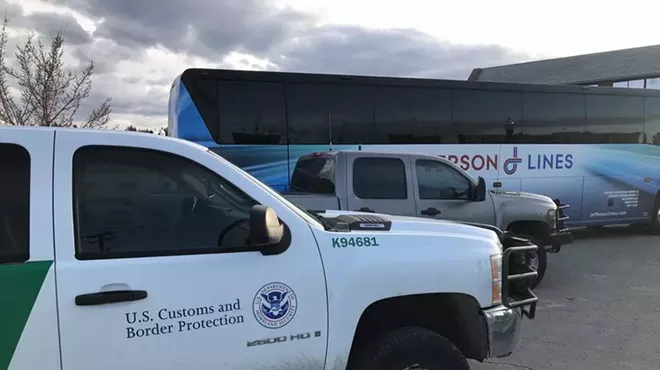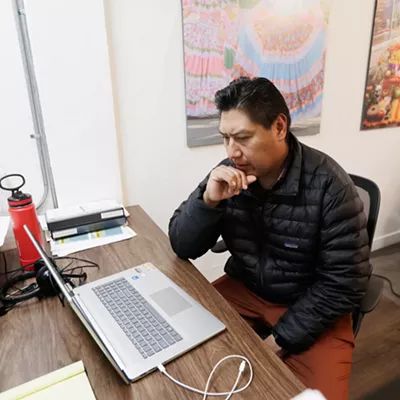
Manel Perdomo struggles to stand from her seat on a Greyhound bus. A U.S. Border Patrol agent is waiting nearby. She's just come from visiting her daughters in Seattle. It's October and the bus stopped in Spokane on its way to Kansas, where she lives.
During her visit to Washington state, Perdomo, 43, suffered a stroke in February. She stayed in the hospital for about a month, she says. It took the better part of this year, recovering in her daughters' care, before she was well enough to travel home.
But first, her bus stops at the Spokane Intermodal Center. Border Patrol agents climb on board.
"They asked everybody, 'Where's your papers?'" Perdomo recalls. "And I say, 'I'm illegal.' I'm honest. Then I say, 'I'm disabled. Can you help me with my bags?'"
"You'll stay in detention tonight," she recalls one of the agents saying as they got off the bus.
The arrest set off a chain reaction of calls from Perdomo's daughters to local immigration attorneys. They worried about their mother, who needed help with simple tasks. Vanessa Nelsen with World Relief Spokane and Alycia Moss, who is in private practice in Coeur d'Alene, scrambled to get Perdomo released.
Both attorneys say that Perdomo's arrest is just one example of the wider net cast by executive orders handed down by President Donald Trump. With all the talk of travel bans and thus far empty promises to build a wall on Mexico's dime, Trump is also targeting undocumented people already living in the U.S., regardless of whether they're convicted, or even suspected, of committing any crime.
Trump's campaign rhetoric disparaging Mexican people as drug dealers, criminals and rapists has manifested as an aggressive, hard-line policy to scoop up anyone who is in the country without permission, attorneys say.
"They didn't have to detain her," Nelsen says. "It used to be that criminals were a priority, and now we're snagging disabled women off a bus after spending time with her daughters. It's not like she's a flight risk. We're expanding a lot of government resources detaining and deporting individuals who should not be a priority."
Five days after Trump's inauguration, he signed an executive order outlining his priorities for immigration enforcement inside America's borders.
Whereas former President Obama dedicated resources to suspected terrorists, gang members, felons and those caught entering the country illegally, Trump's priorities broadened to include minor crimes and those "charged," but not yet convicted, of an offense.
Not long after, Moss, the Coeur d'Alene attorney, says she began noticing more people arrested at the Spokane Intermodal Center.
Nelsen, with World Relief Spokane, remembers attending a Border Patrol presentation a couple of years ago. The agent said "the priority was to look the other way unless they were involved in some kind of criminal activity," she recalls now.
The administration's shift in policy, coupled with Border Patrol's unique legal authority to search for undocumented people without a warrant, seems to make Spokane's bus station into a de facto checkpoint. Within 100 miles of the border, agents can legally ask people to prove that they're U.S. citizens.
Spokane falls just within that 100-mile range, says U.S. Customs and Border Patrol spokesman Jason Givens.
"Anecdotally, I believe enforcement is higher during this administration because of stories and from what is happening to my clients, which includes more enforcement at the bus station," Moss says. "I imagine the bus station is an easy place because of the I-90 corridor. People are traveling from big city to big city and the bus stops in Spokane. I think Spokane has a very robust enforcement program. And this increase in enforcement comports with the Trump administration's rhetoric and recent executive orders."
Border Patrol agents have routinely searched buses in Spokane for several years, Givens says. The executive order regarding interior immigration enforcement has no bearing on the agency's focus on bus stations.
"It's business as usual," he says, adding that the effect of Trump's order is likely more prominent in arrests by Immigration and Customs Enforcement, or ICE.
Indeed, earlier this year reports began circulating of ICE agents milling around courthouse campuses around the country and arresting those suspected of being in the country illegally. Judges took notice.
In March. then-Washington State Supreme Court Chief Justice Mary Fairhurst wrote to then-Homeland Security Secretary John Kelly. Immigration agents' presence on courthouse campuses "impede[s] the fundamental mission of our courts, which is to ensure due process and access to justice for everyone, regardless of their immigration status," she wrote.
By the end of April, 100 days after Trump signed the executive order, arrests by ICE nationwide had increased by nearly 40 percent over the same period in 2016, the agency announced. While that effort netted more than 4,600 more arrests of convicted criminals, "more than half of the increase in arrests were of immigrants who had committed no crime other than being in the country without permission," the New York Times reported.
And while arrests have gone up, ICE deported fewer people in the 2017 fiscal year, which ended in September, than in 2016.
Within ICE's Seattle region, which includes Washington, Oregon and Alaska, agents arrested more than 3,100 people in the 2017 fiscal year, according to data provided by an ICE spokesperson. Arrests of people without criminal convictions — people like Perdomo — has nearly tripled, to 696.
Moss and Nelsen could not help Perdomo quick enough. She spent two nights in the Spokane County Jail, she says, where her heart began to beat faster. With high blood pressure, she knew her risk of having another stroke increased.
"Really, really bad experience when I was in jail," she says through an interpreter, holding back tears. "I've never been in jail before, and there was nobody there to help me. I was all by myself."
Although she spent two nights behind bars, Perdomo's situation is an outlier among others detained for immigration violations, Moss says.
Perdomo was released without any restrictions, which means she is free to travel back to Kansas. Many undocumented people are quickly transferred to the Northwest Detention Center in Tacoma to await a deportation hearing, Moss says.
And because immigrants are not entitled to a government-funded attorney, most appear in front of the judge with no lawyer. This is changing in some cities, and results are promising. According to a study of the first public defender system for immigrants in America, those with legal representation are 12 times as likely to be successful.
Neither Moss nor Nelsen has officially signed onto Perdomo's case. Both attorneys believe she has a good defense against deportation, but declined to elaborate. Eventually, she'll stand trial in front of an immigration judge.
If she's allowed to stay, Perdomo is considering a move to Washington to be with her daughters, attorneys say.
If she's sent back to Mexico, she says she'll be going back to nothing. ♦
























